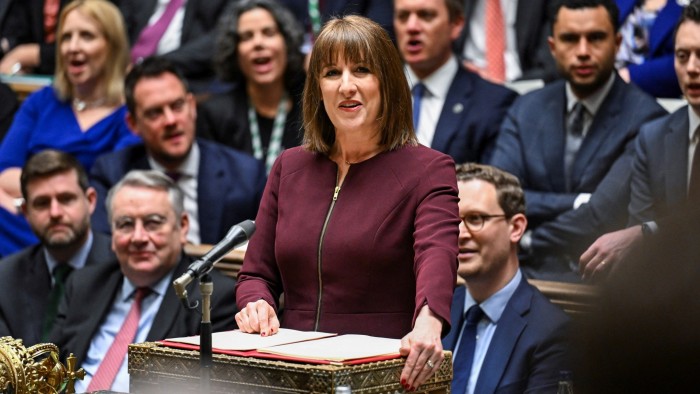Unlock the Editor’s Digest for free
Roula Khalaf, Editor of the FT, selects her favourite stories in this weekly newsletter.
In last Wednesday’s Spring Statement, Rachel Reeves, chancellor of the exchequer, did exactly what was expected of her. Confronted, as predicted, with worse forecasts from the Office for Budget Responsibility than those of last October, the government tweaked plans for spending and revenue, with a view to restoring the headroom the OBR judges it had lost relative to its fiscal targets five years hence. Was this sensible? No.
As I argued two weeks ago, the world has changed substantially, not least given the need to raise defence spending substantially. In this context, the government should have asked itself whether it needed to reconsider some of its self-imposed restrictions on tax and spending. More broadly, as Andy Haldane has argued, there is little sense in making such adjustments to revenue and spending in response to changes in highly uncertain forecasts. It would be wiser to have fewer fiscal events and also set targets and produce forecasts in terms of ranges of outcomes rather than inevitably incorrect point estimates.
The OBR process does, however, offer a different opportunity. This is to provide a rigorous outside assessment of the impact of the government’s structural reforms. Such reforms are now essential, given the UK’s miserable economic performance. Indeed, as my colleague Chris Giles noted in his comment on the Spring Statement, the latter is the biggest economic issue by far: disappointment is piling upon disappointment, as slow growth continues. Between 2019 and 2024 the economy expanded by a mere 3.4 per cent. Worse, from 2015 to 2024, economy-wide productivity rose just 4.4 per cent.
So long as growth remains so slow, no amount of prudence will solve the UK’s difficulties, including its fiscal ones. A stagnant economy is also a “zero-sum” economy, in which more for some groups inevitably means less for others. The politics of such an economy are bound to be fraught. Ultimately, either fiscal discipline or democracy itself is likely to collapse.

It is essential therefore to expand the economy’s supply potential. One of the government’s ideas for doing this — undoubtedly a good one — is to build more houses and infrastructure. The OBR provides an interesting analysis of the former. Its judgment is that it will help, but not by as much as one might have hoped or the economy needs.
Thus, the OBR’s central forecast is that “cumulative net additions to the housing stock in the period to 2029-30 are under 1.3mn. Of this, we estimate 170,000 additions are due to the government’s residential planning reforms and these raise GDP by 0.2 per cent at the forecast horizon.” As always in such forecasts, there are large uncertainties. Capacity constraints — a lack of skilled workers, powerful opposition to building or obstacles created by judicial review — might prove more binding than expected. Yet it is also possible to imagine that economies of scale or other improvements in efficiency might lead to still greater expansions in supply.

In the OBR’s “low scenario”, the expansion in supply is 100,000 units lower by 2029-2030 than in the central forecast. In the “high scenario”, however, it is 100,000 greater than in the central forecast. The corresponding increases in GDP are 0.1 and 0.3 per cent. Increases in housing supply relative to what would have happened without the new measures should make house prices modestly lower than they would otherwise have been. The OBR also assumes that the economic benefits would build over time, as people move to more productive areas. Nevertheless, a much bigger housebuilding programme than this would be needed to transform the availability of housing and lower prices sharply.
This suggests that the government must be far more radical if it is to improve growth prospects substantially. Dramatic reductions are needed, for example, in the cost of constructing infrastructure. Sharp improvements are also needed in public-sector productivity. Particular attention must be paid to promoting innovation. The need to expand spending on defence could help in this regard. Pension reform, wisely done, might greatly improve the availability of risk capital. Reform and simplification of the tax system is also essential. Last but not least, the government should avoid any serious unforced errors. Its decisions to raise the cost of labour through higher taxation, higher minimum wages and much tighter regulation could prove huge mistakes.
The government must not allow itself to be buried in endless tweaking of the fiscal position. It must focus instead on radical pro-growth structural reforms. They may not work quickly. But they are the only thing that will work at all in the long run. Big reforms are vital.









